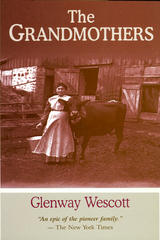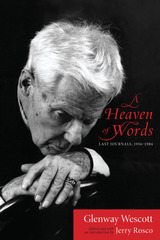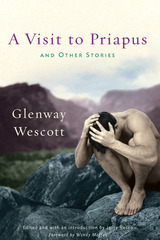3 books by Wescott, Glenway

Grandmothers
A Family Portrait
With a New Introduction by Sargent Bush Jr.
University of Wisconsin Press, 1996
Glenway Wescott’s poignant story of nineteenth-century Wisconsin was first published in 1927 as the winner of the prestigious Harper Prize. Like F. Scott Fitzgerald and Ernest Hemingway, Wescott left the Midwest behind to live as a writer in 1920s Paris. In this novel, based on Wescott’s own life and family, the young Alwyn Tower leaves Wisconsin to travel in Europe, but finds himself haunted by a family of long-dead spirits—his grandparents and great-uncles and aunts, a generation whose young adulthood was shattered by the Civil War. Their images were preserved in fading family albums of daguerreotypes and in his own fragmented memories of stories told to him by his strong and enduring grandmothers. To disinter and finally lay to rest the family secrets that lingered insistently in his mind, Wescott writes, Alwyn was “obliged to live in imagination many lives already at an end.”
The Grandmothers is the chronicle of Alwyn’s ancestors: the bitter Henry Tower, who returned from Civil War battlefields to find his beautiful wife Serena lost in a fatal fever; Rose Hamilton, robust and eager, who yearned to leave the cabin of her bearded, squirrel-hunting brothers for the company of courteous Leander Tower; the boy-soldier Hilary Tower, whose worship of his brother made him desperate; fastidious Nancy Tower, whose love for her husband Jesse Davis could not overcome her disgust with the dirt under his fingernails; Ursula Duff, proud and silent, maligned among her neighbors by her venal husband; Alwyn’s parents, Ralph Tower and Marianne Duff, whose happiness is brought about only by the intervention of a determined spinster.
The Grandmothers is the chronicle of Alwyn’s ancestors: the bitter Henry Tower, who returned from Civil War battlefields to find his beautiful wife Serena lost in a fatal fever; Rose Hamilton, robust and eager, who yearned to leave the cabin of her bearded, squirrel-hunting brothers for the company of courteous Leander Tower; the boy-soldier Hilary Tower, whose worship of his brother made him desperate; fastidious Nancy Tower, whose love for her husband Jesse Davis could not overcome her disgust with the dirt under his fingernails; Ursula Duff, proud and silent, maligned among her neighbors by her venal husband; Alwyn’s parents, Ralph Tower and Marianne Duff, whose happiness is brought about only by the intervention of a determined spinster.
[more]

A Heaven of Words
Last Journals, 1956–1984
Glenway Wescott; Edited and with an introduction by Jerry Rosco
University of Wisconsin Press, 2013
Charm, wit, compassion, wisdom, literature, nature, sex, humor, politics, sorrow, love: these themes fill the late journal pages of enigmatic American writer Glenway Wescott. From humble beginnings on a poor Wisconsin farm, Wescott went on to study at the University of Chicago, narrowly survive the Spanish flu pandemic, and eventually emerge as an influential poet and novelist. A major figure in the American literary expatriate community in Paris during the 1920s and a prominent American novelist in the years leading up to World War II, he spent a decade living abroad before relocating permanently to New York and New Jersey with his partner, Museum of Modern Art publications director and curator Monroe Wheeler.
Together they mixed with such intellectual and creative greats as Jean Cocteau, Colette, George Platt Lynes, Paul Cadmus, Somerset Maugham, Christopher Isherwood, Marianne Moore, W. H. Auden, Truman Capote, Joseph Campbell, and scores of other luminaries. During the second half of his life, Wescott wrote nonfiction essays and worked for the Academy Institute of Arts and Letters, all the while keeping journals in which he recorded the experiences that fostered his love of life, literature, the arts, and humanity. A Heaven of Words looks back on Wescott's entire fascinating life and reveals the riveting narrative of his last decades.
Winner, Gay Memoir/Biography, Lambda Literary Awards
Winner, Gay Memoir/Biography, Lambda Literary Awards
[more]

A Visit to Priapus and Other Stories
Glenway Wescott; Edited and with an introduction by Jerry Rosco; Foreword by Wendy Moffat
University of Wisconsin Press, 2013
Just as E. M. Forster's novel of gay love, Maurice, remained unpublished throughout his lifetime, Glenway Wescott's long story "A Visit to Priapus" was also destined to be a posthumous work, buried from 1938 until this century in Wescott's massive archive of manuscripts, journals, notebooks, and letters.
The autobiographical story is about a literary man, frustrated in love, who puts aside his pride and makes a date with a young artist in Maine. Lavishly rendered in Wescott's elegant prose, the tale is explicit where it needs to be, but—as is typical of Wescott—it is filled with descriptive beauty and introspective lessons about sex and sexuality, love and creativity.
Previously published in anthology form in the United Kingdom, "A Visit to Priapus" is presented for the first time in book form in America, containing previously uncollected stories, including three never before published. The result is a candid portrayal of the gifted but enigmatic writer who was famous in youth and remained a perceptive and compassionate voice throughout his long life. Drawn together from midcentury literary journals and magazines of the 1920s and 1930s, as well as from Wescott's papers, the stories were inspired by his life, from childhood to old age, from Wisconsin farm country to New York, London, Germany, and Paris.
Finalist, Gay General Fiction, Lambda Literary Awards
Finalist, Gay General Fiction, Lambda Literary Awards
[more]
READERS
Browse our collection.
PUBLISHERS
See BiblioVault's publisher services.
STUDENT SERVICES
Files for college accessibility offices.
UChicago Accessibility Resources
home | accessibility | search | about | contact us
BiblioVault ® 2001 - 2024
The University of Chicago Press









